|
|
|
Sort Order |
|
|
|
Items / Page
|
|
|
|
|
|
|
| Srl | Item |
| 1 |
ID:
070157
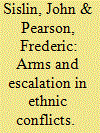

|
|
|
| 2 |
ID:
109140
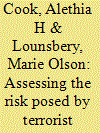

|
|
|
|
|
| Publication |
2011.
|
| Summary/Abstract |
While terrorist organizations have been analyzed for their motivations and tactics, little has been done to develop a systematic understanding of what makes some groups more dangerous than others. Knowing what makes some groups more threatening than others, or what conditions can influence a single group to become more or less of a threat, would help governments to prioritize resources during counterterrorism efforts. Using an approach similar to Ted Robert Gurr's assignment of a risk score to identify impending minority group rebellion, this article develops and tests a set of terrorist organizational characteristics. A two-phased approach is used. First, the authors identify key characteristics that could be anticipated to drive groups to be more active or deadly. The characteristics were identified and measured for terrorist groups for 1990-1994. The authors test group characteristics against subsequent group violence intensity from 1995 to 1999. Findings indicate that some group characteristics, such as religious ideology and group size, are important to understanding a group's relative level of violence. Though the study focused on a relatively short period of time, the findings indicate that a more comprehensive study of the impact that group characteristics have on violence levels would be a worthwhile undertaking.
|
|
|
|
|
|
|
|
|
|
|
|
|
|
|
|
| 3 |
ID:
109433
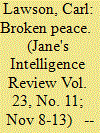

|
|
|
| 4 |
ID:
184356
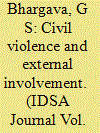

|
|
|
| 5 |
ID:
127769
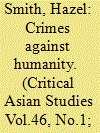

|
|
|
|
|
| Publication |
2014.
|
| Summary/Abstract |
The United Nations Human Rights Council (UNHRC) Commission of Inquiry, established in 2013 to investigate human rights violations in North Korea, identified food rights violations, among other abuses, as potentially constituting crimes against humanity. A contradiction arises in that UNHRC claims of food rights violations in the DPRK are not congruent with the statistical indicators emanating from the UN humanitarian and development agencies that have worked in the DPRK since the mid 1990s and that have engaged in and published substantial research on food, nutrition, and health. The author of this article contends that North Korea has an oppressive government and argues that the lack of transparency makes the many things that are unknown about North Korea, especially its opaque penal system, of legitimate ethical and political concern. Reasonably good data on issues pertaining to social and economic rights do exist, however, as this article shows. The inconsistency between the received wisdom on food and nutrition is of concern because the potential consequences of a state being judged as committing crimes against humanity include military intervention and consequent threats to life for millions. This article reconsiders how and why the received wisdom becomes unchallenged and unchallengeable in scholarly, policy, and media discourse. Inconsistency and misrepresentation is not primarily due to conscious bias but much more because of the unconscious adoption of a securitized perspective through which knowledge about North Korea is filtered. The article argues for reframing North Korean human rights issues on the basis that North Korean society is neither unique nor unknowable.
|
|
|
|
|
|
|
|
|
|
|
|
|
|
|
|
| 6 |
ID:
124517
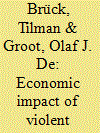

|
|
|
|
|
| Publication |
2013.
|
| Summary/Abstract |
Much of the work published in Defence and Peace Economics (DPE) significantly contributes to our understanding of the economics of conflict. Analyzing the second decade of its existence, Arce and Kollias (2010) showed that over time, the emphasis of work in DPE has shifted significantly. One rising field examines the consequences of conflict. Related to this, in 2011, DIW Berlin hosted a conference examining The Economic Impact of Violent Conflict. This special issue is the result of that conference. While this may seem like a relatively narrow area, the interpretation of that simple combination of words can be quite broad. Some of the core work in the area focuses on the calculation of the global impact of conflict (Collier, 1999, Hess, 2003, Brück, De Groot, and Bozzoli, 2012). The work of Collier (1999) has had the greatest impact and continues to do so. He focuses only on civil conflicts because of the perceived economic strengthening effects of international conflict. Collier argues that civil conflict affects growth through (i) the destruction of resources; (ii) the disruption of infrastructure and social order; (iii)
budgetary substitution; (iv) dissaving; and (v) portfolio substitution by foreign investors.
The first four of these channels are expected to influence an economy only during conflict, whereas the final one is likely to continue having a lasting effect even after the restoration of peace. This led Collier to come to his theory that the length of the conflict is going to influence the impact of the post conflict period. In particular, he argues that long-running conflicts are more likely to be followed by an increase in growth, whereas short-lasting conflicts will suffer reduced growth rates over a longer period of time (known as a legacy effect).
|
|
|
|
|
|
|
|
|
|
|
|
|
|
|
|
| 7 |
ID:
141229
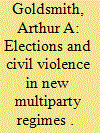

|
|
|
|
|
| Summary/Abstract |
The introduction of multiparty competition around the world following the Cold War raises the specter of rising civil violence during election periods in emerging democracies and hybrid regimes. Yet there are also plausible theoretical reasons to expect dropping civil violence around elections in these states or, alternatively, no significant change in the level of such conflict. This article tests these hypotheses in Africa with the aid of event data on the daily rate of civil violence incidents (1997–2013). It asks if civil violence in that region is more frequent, less frequent or constant during election cycles compared to other times. To guard against definitional and data selection problems encountered in some prior cross-national studies of elections and use of force, the research design emphasizes the relative risk of social conflict at the national level. The analysis suggests three distinct patterns in Africa. Given countrywide norms, election periods in most countries run the same relative risk of a day with violent events as do non-election periods. A subset of African countries exists, however, with more civil violence during elections when judged against the national reference line for conflict. There is a smaller group of countries where the risk of electoral civil violence is comparatively low. While caution should be exercised in interpreting the findings, the policy implication is that no general reason exists to preclude or defer elections in Africa as a way to minimize social conflict associated with political campaigns, although there may be specific reasons to do so in particular countries.
|
|
|
|
|
|
|
|
|
|
|
|
|
|
|
|
| 8 |
ID:
130809
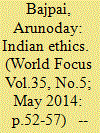

|
|
|
|
|
| Publication |
2014.
|
| Summary/Abstract |
The contemporary global community continues to be in throes of multiple problems accumulated in the course of growth and development of human civilization. The problems of violence within and among nations: rising terrorism and organized crimes in different parts of the globe; increasing poverty and hunger: threatening dimensions of food and energy crises and to cap it all pending catastrophe of climate change and other forms of environmental degradation. it is not that the global community- and nations collectively or individually are not aware of these challenges or they have failed to corrective actions. We are more aware of these problems than any time in the history of mankind. Also. we have put in place various strategies. policies and mechanisms to manage. and solve these challenges. Even global community has suddenly woken up to the call for switching over to the alternative vision of sustainable development. However. the alternative sustainable development strategy seems faltering amidst of unsustainable ideas and practices inspired by materialistic progress and over emphasis on sel?sh interests of nations and individuals alike. The moot question is how the prevailing development paradigms fashioned and refashioned to suits the needs of evolving globalized economy is capable of facing these challenges? What are its ethical foundations? What alternative ethical framework or vision we can evolve? And ?nally, how the Indian ethical framework is relevant for this alternative vision?
|
|
|
|
|
|
|
|
|
|
|
|
|
|
|
|
| 9 |
ID:
130384
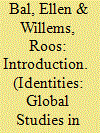

|
|
|
|
|
| Publication |
2014.
|
| Summary/Abstract |
This special issue addresses the imagination of futures 'away from home' in a globalising world. While a growing number of migration scholars have taken into account that migration considerations are always socially embedded and culturally informed, the processes at work among a mounting number of (young) men and women throughout the world, who are convinced that a better life can only be found 'away from home', have been notably understudied. This special issue goes beyond the study of migration aspirations as a question of migration only. It focuses on the specific contexts (in five different countries) within which migration dreams are born, and sometimes even cultivated. It explores the sociocultural embedding of these aspirations by investigating the interpretation of local realities versus global possibilities, and examines how the aspirations of so many worldwide link up to the wider interconnections between globalisation and the sociocultural, political and economic transformations 'back home'.
|
|
|
|
|
|
|
|
|
|
|
|
|
|
|
|
| 10 |
ID:
098086
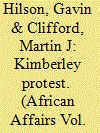

|
|
|
|
|
| Publication |
2010.
|
| Summary/Abstract |
The temporary suspension of diamond exports in Ghana in 2006 and 2007 is arguably the most significant move to address mounting criticisms of the Kimberley Process Certification Scheme (KPCS), an international initiative aimed at stemming the flow of rough diamonds used to finance wars. The ban, which took effect in November 2006, was much praised, particularly in civil society circles, where it continues to be seen as a genuine effort to prevent the smuggling of 'conflict diamonds'. At the time, Ghana was accused of harbouring stones originating from rebel-held territories in neighbouring Côte d'Ivoire. No evidence was found in support of the case that it was a repository for 'conflict diamonds', however, and exports resumed early in March 2007. This article examines the context for the accusations of Ghana's implication in the smuggling of illicit diamonds, and draws on recent fieldwork to explain how the suspension has affected Akwatia, the country's main diamondiferous area. The actions taken raise important questions about how suspected violators - particularly smaller diamond-producing nations - of the KPCS should be handled, and underscore how global compacts can have a host of negative repercussions at the village level.
|
|
|
|
|
|
|
|
|
|
|
|
|
|
|
|
| 11 |
ID:
097765
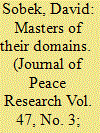

|
|
|
|
|
| Publication |
2010.
|
| Summary/Abstract |
Civil wars are complex events affected by numerous factors. Recent research, however, seems to have concentrated on the rebels and their motivations to the exclusion of how the state can affect the onset and outcome of civil wars. This special issue addresses this lacuna by looking at the role of state capacity. In particular, state capacity is a multi-dimensional concept that encompasses not only the extractive abilities of a state but also economic development and bureaucratic quality. Despite the various ways in which state capacity can be measured, the articles clearly show that strong states have a decreased risk of experiencing a civil war, although there is evidence that civil violence decreases state capacity, implying a reverse causality. In addition, it appears that the capable states that do experience civil violence are more able to credibly commit to a negotiated solution, which increases the possibility of a bargained end to the violence. While these articles do not represent the last word on the subject, they do provide convincing evidence that state capacity plays a critical role in the onset and conduct of civil violence.
|
|
|
|
|
|
|
|
|
|
|
|
|
|
|
|
| 12 |
ID:
128427
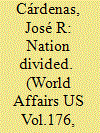

|
|
|
|
|
| Publication |
2014.
|
| Summary/Abstract |
A year after the death of Hugo Chávez from cancer, Venezuela remains as polarized as at any time during the flamboyant strongman's fourteen-year rule. As the dysfunctional economy he bequeathed to his successors continues to unravel-despite proven oil reserves rivaling those of Saudi Arabia-a determined political opposition continues its uphill fight against what Chávez designed as a permanent revolution. President Nicolás Maduro, Chávez's anointed successor, came to power in a special election last April that was much closer than expected, sending shock waves through the chavista ranks. There were enough doubts about the legitimacy of the vote that his opponent, Henrique Capriles, never conceded. Since then, Maduro has struggled to escape Chávez's shadow and assert his authority over the faction-ridden chavista party, the PSUV, a hodgepodge of leftists of all stripes along with a faction of the military loyal to the late president. Maduro has been buffeted by one challenge after another: infrastructure breakdowns leading to electricity shortages, scarcity of basic consumer items, rampant inflation, declining production, an overvalued currency (the black-market rate for dollars is ten times higher than the official exchange), and rampant street crime.
|
|
|
|
|
|
|
|
|
|
|
|
|
|
|
|
| 13 |
ID:
131487
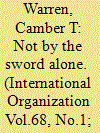

|
|
|
|
|
| Publication |
2014.
|
| Summary/Abstract |
Scholars of civil conflict have long recognized the importance of state strength in the suppression of nascent insurgencies. However, previous empirical investigations have generally focused on the material and coercive dimensions of state power, obscuring the critical role played by the generation of widespread voluntary compliance through processes of political communication, that is, the production of "soft power." In contrast, in this article I focus on a factor-mass communication technology-that can enhance state capacity only by strengthening the state's ability to broadly and publicly disseminate political messages. I argue that the enhanced capacities for large-scale normative influence generated by mass communication technologies can be expected to produce substantial barriers to the mobilization of militarized challenges to state rule, by strengthening economies of scale in the marketplace of ideas. Utilizing newly compiled cross-national data on mass media accessibility in the post-World War II period, I show that densely constituted mass media systems dramatically reduce the probability of large-scale civil violence, thereby providing new evidence for the fundamental importance of nonmaterial state capacities in the suppression of internal armed conflicts.
|
|
|
|
|
|
|
|
|
|
|
|
|
|
|
|
| 14 |
ID:
155234
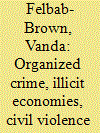

|
|
|
|
|
| Summary/Abstract |
This essay analyzes the multiple threats that organized crime and illicit economies pose to states and the international order, with a particular focus on the security dimensions of the crime-conflict nexus. In analyzing the range of responses by states and the international community to the nexus of criminal economies and civil wars, insurgencies, and terrorism, this essay also highlights how premature and ill-conceived government efforts to combat illicit economies have counterproductive effects, hampering efforts to suppress militancy and, in some cases, generating dangerous international spillovers of criminality. The second part of the essay examines various pathways out of the conflict-crime nexus, including defeating militants without suppressing illicit economies, suppressing crime and illicit economies without ending conflict, and state co-optation of illicit economies. The essay concludes with policy recommendations.
|
|
|
|
|
|
|
|
|
|
|
|
|
|
|
|
| 15 |
ID:
124313
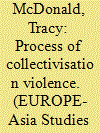

|
|
|
|
|
| Publication |
2013.
|
| Summary/Abstract |
This article attempts to conceptualise violence, and to determine the value of that concept as a lens through which to understand the Soviet collectivisation drive and its legacy. The central claim is that objective violence, the very real experience of the collectivisation drive, becomes subjective violence as it is internalised over time. In the context of the process of collectivisation violence, the lines between victims and perpetrators were blurred in important ways. The end of the Soviet Union triggered a re-evaluation of the meaning of that violence which is still in a state of flux today.
|
|
|
|
|
|
|
|
|
|
|
|
|
|
|
|
| 16 |
ID:
095383
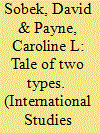

|
|
|
|
|
| Publication |
2010.
|
| Summary/Abstract |
Previous research has implicitly assumed that civil wars represent a coherent category of events, but given the variety of rebel goals that supposition seems tenuous. We split civil wars into those where the rebels simply want to remove the government (replacement) from those where the rebels want to alter the relationship between the state and society (legitimacy). Theoretically, states are most at risk for a civil war of replacement when they extract substantial wealth from society and the government is weak. In contrast, civil wars of legitimacy are more likely to occur in states where the rebels have both grievances and a means to maintain their future viability. An empirical analysis of civil wars of replacement and legitimacy from 1960 to 1999 confirms both our argument about the different types of civil violence and their differing causes.
|
|
|
|
|
|
|
|
|
|
|
|
|
|
|
|
| 17 |
ID:
127835
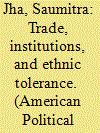

|
|
|
|
|
| Publication |
2013.
|
| Summary/Abstract |
I provide evidence that the degree to which medieval Hindus and Muslims could provide complementary, nonreplicable services and a mechanism to share the gains from exchange has resulted in a sustained legacy of ethnic tolerance in South Asian towns. Due to Muslim-specific advantages in Indian Ocean shipping, interethnic complementarities were strongest in medieval trading ports, leading to the development of institutional mechanisms that further supported interethnic exchange. Using novel town-level data spanning South Asia's medieval and colonial history, I find that medieval ports, despite being more ethnically mixed, were five times less prone to Hindu-Muslim riots between 1850 and 1950, two centuries after Europeans disrupted Muslim overseas trade dominance, and remained half as prone between 1950 and 1995. Household-level evidence suggests that these differences reflect local institutions that emerged to support interethnic medieval trade, continue to influence modern occupational choices and organizations, and substitute for State political incentives in supporting interethnic trust
|
|
|
|
|
|
|
|
|
|
|
|
|
|
|
|
|
|
|
|
|